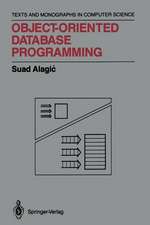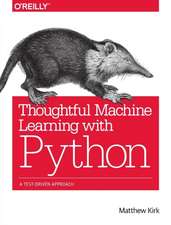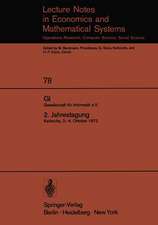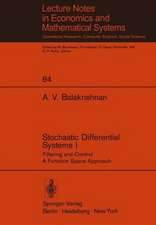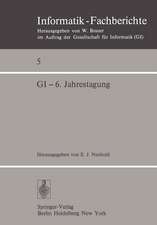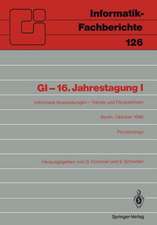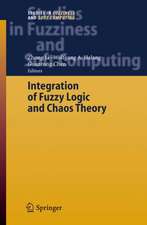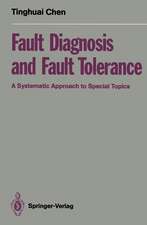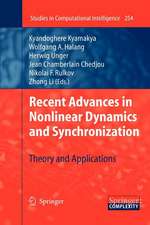Fuzzy Chaotic Systems: Modeling, Control, and Applications: Studies in Fuzziness and Soft Computing, cartea 199
Autor Zhong Lien Limba Engleză Hardback – 22 mai 2006
| Toate formatele și edițiile | Preț | Express |
|---|---|---|
| Paperback (1) | 878.96 lei 38-44 zile | |
| Springer Berlin, Heidelberg – 17 noi 2010 | 878.96 lei 38-44 zile | |
| Hardback (1) | 994.08 lei 6-8 săpt. | |
| Springer Berlin, Heidelberg – 22 mai 2006 | 994.08 lei 6-8 săpt. |
Din seria Studies in Fuzziness and Soft Computing
- 20%
 Preț: 999.85 lei
Preț: 999.85 lei - 20%
 Preț: 653.06 lei
Preț: 653.06 lei - 20%
 Preț: 872.96 lei
Preț: 872.96 lei - 20%
 Preț: 930.57 lei
Preț: 930.57 lei - 20%
 Preț: 1051.00 lei
Preț: 1051.00 lei - 20%
 Preț: 992.44 lei
Preț: 992.44 lei - 20%
 Preț: 655.85 lei
Preț: 655.85 lei - 20%
 Preț: 1001.86 lei
Preț: 1001.86 lei - 18%
 Preț: 954.14 lei
Preț: 954.14 lei - 20%
 Preț: 330.10 lei
Preț: 330.10 lei - 20%
 Preț: 333.04 lei
Preț: 333.04 lei - 20%
 Preț: 997.56 lei
Preț: 997.56 lei -
 Preț: 391.61 lei
Preț: 391.61 lei - 20%
 Preț: 647.79 lei
Preț: 647.79 lei - 20%
 Preț: 986.01 lei
Preț: 986.01 lei - 18%
 Preț: 958.56 lei
Preț: 958.56 lei - 20%
 Preț: 996.40 lei
Preț: 996.40 lei - 20%
 Preț: 999.35 lei
Preț: 999.35 lei - 15%
 Preț: 646.43 lei
Preț: 646.43 lei - 20%
 Preț: 651.57 lei
Preț: 651.57 lei - 20%
 Preț: 997.89 lei
Preț: 997.89 lei - 15%
 Preț: 641.03 lei
Preț: 641.03 lei - 20%
 Preț: 1009.74 lei
Preț: 1009.74 lei - 20%
 Preț: 992.62 lei
Preț: 992.62 lei -
 Preț: 388.72 lei
Preț: 388.72 lei - 18%
 Preț: 1223.43 lei
Preț: 1223.43 lei - 20%
 Preț: 651.42 lei
Preț: 651.42 lei - 18%
 Preț: 951.59 lei
Preț: 951.59 lei - 18%
 Preț: 948.61 lei
Preț: 948.61 lei
Preț: 994.08 lei
Preț vechi: 1242.59 lei
-20% Nou
Puncte Express: 1491
Preț estimativ în valută:
190.21€ • 199.13$ • 157.39£
190.21€ • 199.13$ • 157.39£
Carte tipărită la comandă
Livrare economică 07-21 aprilie
Preluare comenzi: 021 569.72.76
Specificații
ISBN-13: 9783540332206
ISBN-10: 3540332200
Pagini: 312
Ilustrații: XII, 300 p. 131 illus., 4 illus. in color.
Dimensiuni: 155 x 235 x 25 mm
Greutate: 0.61 kg
Ediția:2006
Editura: Springer Berlin, Heidelberg
Colecția Springer
Seria Studies in Fuzziness and Soft Computing
Locul publicării:Berlin, Heidelberg, Germany
ISBN-10: 3540332200
Pagini: 312
Ilustrații: XII, 300 p. 131 illus., 4 illus. in color.
Dimensiuni: 155 x 235 x 25 mm
Greutate: 0.61 kg
Ediția:2006
Editura: Springer Berlin, Heidelberg
Colecția Springer
Seria Studies in Fuzziness and Soft Computing
Locul publicării:Berlin, Heidelberg, Germany
Public țintă
ResearchCuprins
Fuzzy Logic and Fuzzy Control.- Chaos and Chaos Control.- Definition of Chaos in Metric Spaces of Fuzzy Sets.- Fuzzy Modeling of Chaotic Systems – I (Mamdani Model).- Fuzzy Modeling of Chaotic Systems – II (TS Model).- Fuzzy Control of Chaotic Systems – I (Mamdani Model).- Adaptive Fuzzy Control of Chaotic Systems (Mamdani Model).- Fuzzy Control of Chaotic Systems – II (TS Model).- Synchronization of TS Fuzzy Systems.- Chaotifying TS Fuzzy Systems.- Intelligent Digital Redesign for TS Fuzzy Systems.- Spatiotemporal Chaos and Synchronization in Complex Fuzzy Systems.- Fuzzy-chaos-based Cryptography.
Textul de pe ultima copertă
"Fuzzy Chaotic Systems" provides original heuristic research achievements and insightful ideas on the interactions or intrinsic relationships between fuzzy logic and chaos theory. It presents the fundamental concepts of fuzzy logic and fuzzy control, chaos theory and chaos control, as well as thedefinition of chaos on the metric space of fuzzy sets. This monograph discusses and illustrates fuzzy modeling and fuzzy control of chaotic systems, synchronization, anti-control of chaos, intelligent digital redesign, spatiotemporal chaos and synchronization in complex fuzzy systems; as well as a practical application example of fuzzy-chaos-based cryptography. Like other very good books, this book may raise more questions than it can provide answers. It therefore generates a great potential to attract more attention to combine fuzzy systems with chaos theory and contains important seeds for future scientific research and engineering applications.
Caracteristici
Overviews the theory, methodologies and applications of the fascinating field of Fuzzy systems and Chaos Generates a great potential to attract more attention to combine fuzzy systems with Chaos theory and contains important seeds for future scientific research and engineering applications



